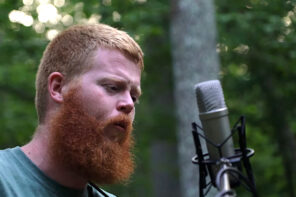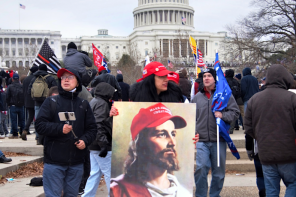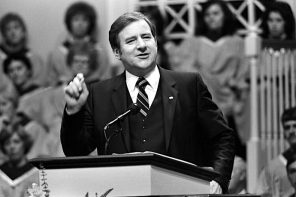“I honestly believe that the Beatles were really gifted and blessed by God to start a spiritual revolution in America, but I think they scored points for the wrong team.”
—Ricky Skaggs on the New York Times popcast
“He’s God’s man for this time.”
—Ricky Skaggs on George W. Bush, 2004
The country and bluegrass musician Ricky Skaggs has spent his time on the hustings for the religious right; most notably in the 2004 election. More recently, he has turned to an interesting cast of producers and guest artists (including Peter Frampton, of Frampton Comes Alive fame) to record a country-pop album, Mosaic, which avoids ideology in favor of a gentle musicality.
The multitalented mandolin player and singer began his career with Bill Monroe and the Bluegrass Boys, first taking the stage at the age of six. In the last two decades, he put in time singing for religious right rallies, part of a movement of country music to the right.
In recent years, country songwriters have seemed to be virtually required to produce jingoistic populist anthems—from Charlie Daniels’ anthems of praise to the military might of the Reagan years to Toby Keith’s “Courtesy of the Red, White, and Blue” (which spoke of the U.S. putting a “boot in your ass”). Those who transgress (see “Chicks, Dixie” in your dictionary) are hounded off the radio. And those who did play in that world (see Johnny Cash in the 1980s) lost that audience when they explored deeper, darker themes. The era of the Sunbelt and Republican culture wars turned “country” into a soundtrack for the jingoistic right.
But the association of country and the political right is a recent invention, without any deep roots in the history of the Southern working class. Country had come out of a religious culture of rural working-class folk; if they did not always match up to the dreams of the Popular Front Left, their theology of doubt and struggle with darker forces had little resonance with the political right, either. Their world was a dark one, with social problems that were intractable and spiritual forces that were untamable.
Personal, Not Political
On his newest record, Mosaic, Skaggs has taken a step back into themes familiar in the religious history of the South, and away from the culture wars. As the opening epigraph suggests, he hasn’t gone soft on his religious belief, and the apocalyptic message drawn from the book of Elijah on Mosaic suggests that premillennial imagery still exerts a hold.
But the message is fundamentally personal, not political. And that’s a good thing.
In Mosaic, Skaggs hits a vein of Southern religious populist imagery that neither the folkie-left from days of yore nor the jingoistic right of much pop country has ever fully grasped. It was not that early country could never be politicized, or topical; natural disasters, epochal events, and moral admonitions were the stock in trade of country and blues musicians and songwriters alike.
But the more recent culture wars tie between country, religious fundamentalism, and a Tea Party civil religion is an invented tradition. Historically, it lacks any deep roots in the white Southern tradition of musical expression. Even fundamentalism as an ideology had to be more or less imported from elsewhere (most especially, from Northern seminaries which recruited down South and established emissary posts there). Historically, Southern music at its best—the bluesmen, the Carter family, Charlie Poole, and the corpus of the old, weird America—simply could not be tied down to any particular political message or program. This music was about a world beyond one’s control. Its occasional bromides or homilies were not nearly as convincing as its unforgettable portrayals of the darker difficulties of survival in a harsh and uncertain world.
The Southern country tradition was populist in a different sense from populist politics of left or right. The art derived from the religious experiences of ordinary folk living in a world of uncertainty, constant economic distress, and social ostracism was full of the lonesome cries of individuals. Songs spun tales of individual drifters, of gamblers searching vainly for the jack of diamonds, of hoping that death would “spare me over another year.” They came from the gut-wrenching experiences of the Southern rural working class, people who were poor recruits for the modernist fundamentalism of conservative townspeople, and difficult material to mold into an organized movement. [Note: John Hayes’ dissertation “Hard, Hard Religion: Faith and Class in the New South” (University of Georgia, 2007) plumbs their experience as well as anyone ever has.]
Once, after hearing a moving address at an academic conference on the history of Southern working people during the Depression, I asked a colleague of the presenter how she liked the talk. “But,” she sputtered in some irritation, “these people all voted for [George W.] Bush!.” She just couldn’t square the paean to Southern populism that she heard in the talk with the voting patterns of ordinary working-class Southern whites today.
In the post-1960s era, as the populism of “these people” trended rightward, musicians followed their audiences, and white Southern country attached itself to a right-wing populism most memorably portrayed (even if in a kind of self-satire that fans didn’t catch) in Merle Haggard’s “Okie from Muskogee.”
Ricky Skaggs’ move first from more commercial country into bluegrass, and more recently to original songs that recall and give a smooth pop gloss to an older Southern ancestry of country and gospel, is a harbinger of how this older tradition (the “alt-country” offered by “No Depression” hipsters and revivalists) may be finding its way into a broader country mainstream.
When the emotional resonances of personal struggles and religious visions take precedence over the broader messages of God and country, then we are back in the realm of what pop-country can do best. The gentle spiritual quests portrayed in these songs stands in marked contrast to the vitriol of our political culture. Most likely, Ricky Skaggs has not changed his politics one iota, but by following an artistic muse and spiritual calling, he has produced a listenable antidote to the angry anthems of our time.




